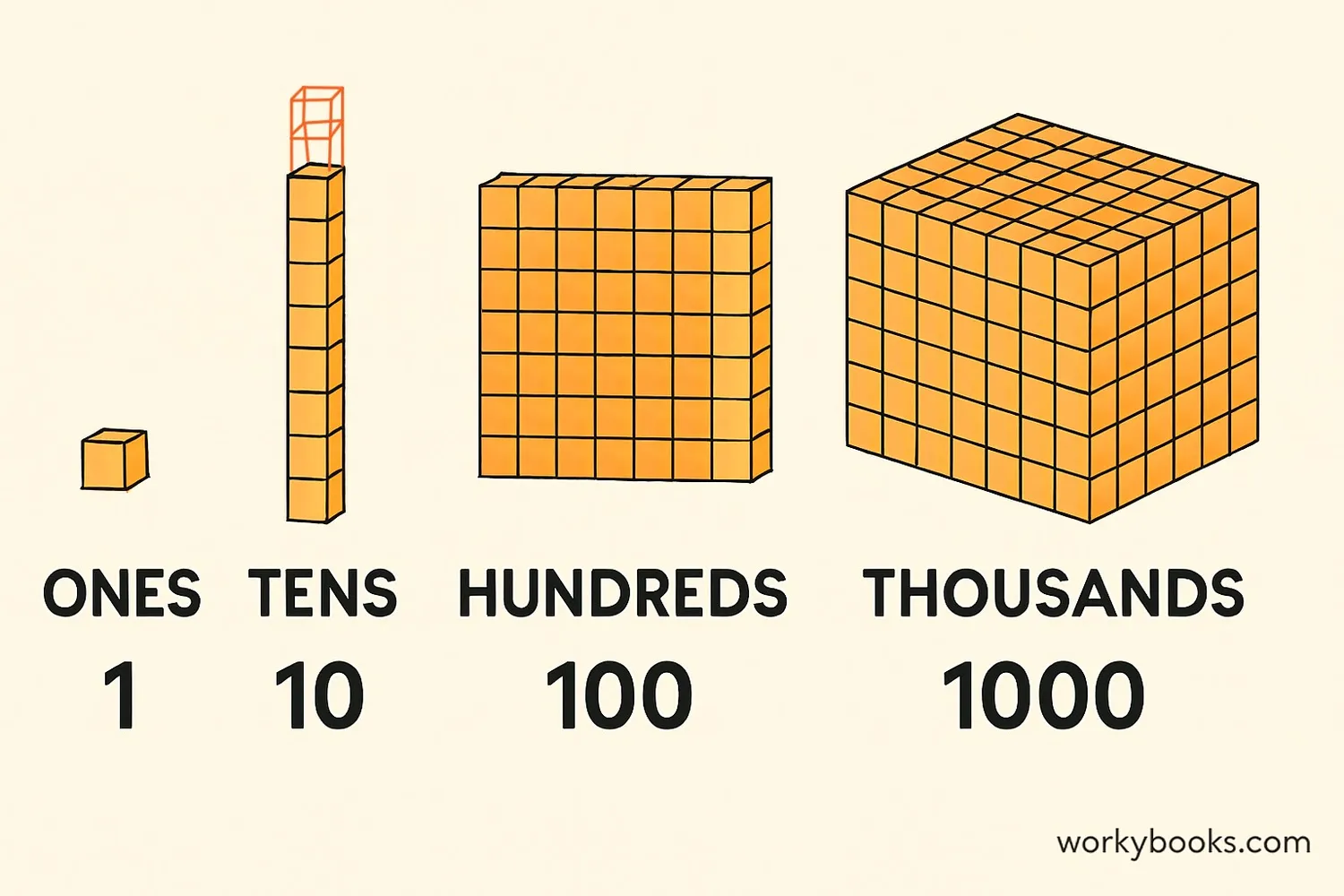International Place Value System - Definition, Examples, Quiz, FAQ, Trivia
Learn how numbers are organized and read in the international place value system
What is Place Value?

Place value is the value of each digit in a number based on its position. For example, in the number 345, the digit 3 is in the hundreds place and represents 300, the digit 4 is in the tens place and represents 40, and the digit 5 is in the ones place and represents 5.
Understanding place value is essential for working with numbers, as it helps us read, write, and compare numbers correctly. Different cultures have developed different place value systems to organize and work with large numbers.
Key Concept
The value of a digit depends on its place or position in the number. Each place is 10 times the value of the place to its right.
International Place Value System
The international place value system is used by most countries around the world. It organizes numbers into groups of three digits called periods. Each period is separated by a comma.
The main periods in the international system are:
| Billions | Millions | Thousands | Ones |
|---|---|---|---|
| Hundred Billions | Ten Billions | Billions | Hundred Millions | Ten Millions | Millions | Hundred Thousands | Ten Thousands | Thousands | Hundreds | Tens | Ones |
| 100,000,000,000 | 100,000,000 | 100,000 | 100 |
In the international system, we write large numbers with commas separating every three digits from the right. For example, the number 5,342,167 is read as "five million, three hundred forty-two thousand, one hundred sixty-seven."
Remember
In the international system, each period has three digits, and periods are separated by commas.
How to Read Numbers in the International System
Reading large numbers in the international system is easy when you follow these steps:
1. Separate the number into periods using commas from right to left.
2. Read each period separately from left to right.
3. Add the period name after each period (except the ones period).
Let's practice with an example:
Step 1: The number is already separated into periods - 7 (millions), 452 (thousands), 961 (ones)
Step 2: Read each period: 7 = "seven", 452 = "four hundred fifty-two", 961 = "nine hundred sixty-one"
Step 3: Add period names: "seven million, four hundred fifty-two thousand, nine hundred sixty-one"
Reading Tip
We don't add the period name for the ones period. Also, if a period has all zeros, we don't read that period at all.
International vs. Indian Place Value System
While most countries use the international place value system, India uses a slightly different system. The main differences are:
| Feature | International System | Indian System |
|---|---|---|
| Periods | Ones, Thousands, Millions, Billions | Ones, Thousands, Lakhs, Crores |
| Grouping | Groups of 3 digits | First group of 3, then groups of 2 |
| Comma Placement | Every 3 digits from right | Different pattern after thousands |
| Number Names | Million, Billion | Lakh, Crore |
| Example: 1,000,000 | One million | Ten lakh |
| Example: 10,000,000 | Ten million | One crore |
In the Indian system, after the thousands period (3 digits), numbers are grouped in sets of two digits: lakhs (1,00,000) and crores (1,00,00,000). This is different from the international system which continues with groups of three digits: millions (1,000,000) and billions (1,000,000,000).
Did You Know
Pakistan, Bangladesh, Nepal, and Sri Lanka also use the Indian numbering system, while most other countries use the international system.
Examples and Practice
Let's practice with some examples of writing and reading numbers in the international place value system:
Example 1: Write 4,305,672 in words
Solution: "four million, three hundred five thousand, six hundred seventy-two"
Example 2: Write "seven billion, twenty million, three hundred four" in digits
Solution: 7,020,000,304
Example 3: What is the place value of 8 in 12,843,976?
Solution: The digit 8 is in the hundred thousands place, so its value is 800,000
Example 4: Expand the number 45,203
Solution: 40,000 + 5,000 + 200 + 0 + 3
Practice converting between different forms helps build a strong understanding of the international place value system.
Practice Tip
Try writing your own large numbers and converting them to words. Practice with numbers up to billions to become comfortable with the international system.
Place Value Practice Quiz
Test your understanding of the international place value system with this 5-question quiz. Choose the correct answer for each question.
Frequently Asked Questions
Here are answers to common questions about the international place value system:
Number Trivia
Discover interesting facts about numbers and place value systems:
Ancient Number Systems
The ancient Babylonians used a base-60 number system around 3000 BC. This is why we have 60 seconds in a minute and 60 minutes in an hour today.
Zero's Importance
The concept of zero as a placeholder was developed independently by ancient civilizations including the Mayans and Indians. Zero is essential for place value systems to work properly.
Largest Named Number
The largest named number is called a "googolplex," which is 10 raised to the power of a googol (1010100). Writing out all the zeros in a googolplex would be impossible—it would require more space than exists in the known universe!
Different Bases
While most modern number systems use base-10 (decimal), some cultures have used different bases. The Yuki people of California used a base-8 system, counting the spaces between fingers rather than the fingers themselves.





